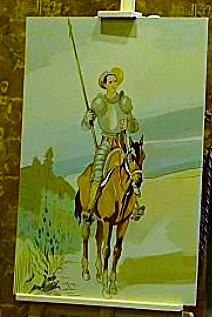Vladimir Putin: Don Corleone at home, Don Quixote abroad
 By Lev Tsitrin
By Lev Tsitrin
It is much harder to deal with idealists than with pragmatists.”
The latter have their price — but not the former. I suspect it was realization that Putin was an idealist that ultimately made President Trump abandon his attempt to mediate the end to the Russia-Ukraine war.
To be fair to Trump, this was not Putin’s traditional reputation. Domestically, he is utterly pragmatic. Unlike the Soviet times, ethnicity is no barrier to success — even to becoming an oligarch. Just don’t meddle in politics and pay kickbacks — and only sky (and your business ruthlessness and savvy) will limit your wealth — and the extravagance with which you spend it. Whoever you are, just stay in your lane — and welcome to the mile-long-yacht owner’s club!
Putin’s invasion of Ukraine — and his persistence in pushing it forward come what may — shows a different, ideological side of Putin. He is no longer a Don Corleone — a ruthless but pragmatic ruler of people and wealth — but a Don Quixote, the man enamored with the heroic past. To be sure, Putin is day-dreaming not of being a knight-errand in search of adventure and justice for the oppressed. He lives in the times when Russian Tsars grabbed surrounding lands to built the Russian Empire, in the time when the Soviet Army repelled the Nazi invasion, .
Born after those heroic times, he seeks to recreate them in the present — and just like Don Quixote, he looks at windmills of modernity and sees the giants of old. Ukraine to him is not a country to engage in commerce with. When he looks at it, Putin sees the conquests of Tsar Peter and Empress Catherine; he looks at Ukrainians and sees fascists who should be crushed just as Stalin crushed Nazi Germany. Just as Don Quixote read novels of chivalry and saw himself as a knight in armor, Putin sees himself as Ivan the Terrible, Peter the Great and Empress Catherine combined, on the mission to “gathere the lands of the Rus” (and when occasion presents itself, snatching an occasional non-Rus hunk of land too). Reading history books makes him want to recreate the old victories — by reattaching to Russia the territories which seceded when the Soviet Union collapsed.
That, to him, is the mission that is every bit as holy as was for Don Quixote the defense of the honor of Dulcinea. In Ukraine, Putin is the Ivan, the Peter, the Catherine combined (and the Joseph Stalin crushing Nazis, to boot.)
And now, Trump steps in to end the quest.
I do not know what Steve Witkoff — Trump’s trusted friend whom he chose as a personal ambassador to Putin — reported back after many hours spent with Putin, but I would not be surprised if his verdict was — “Putin may be a pragmatist at home, but he is not a pragmatist abroad — there, he is an ideologue on a holy mission. You simply cannot dissuade him.”
Trump, being a pragmatist, dropped the mission.
“Kremlinologist” used to be a real profession in the Soviet times — they were people trying to guess what goes on in the heads of the members of Politburo. I don’t know what those “Kremlinologists” studied in college; but it seems to me that you need to be an expert in Cervantes to get into Putin’s mind and understand his Ukraine obsession. And even that may not be of much help — for how do you cure a Don Quixote of his Son Quixotism?
Illustration – Vladimir Putin as Don Quixote from the Putin Universe exhibition of 2015. He was depicted as various heros including Pele, Robin Hood, King Arthur and the Incredible Hulk